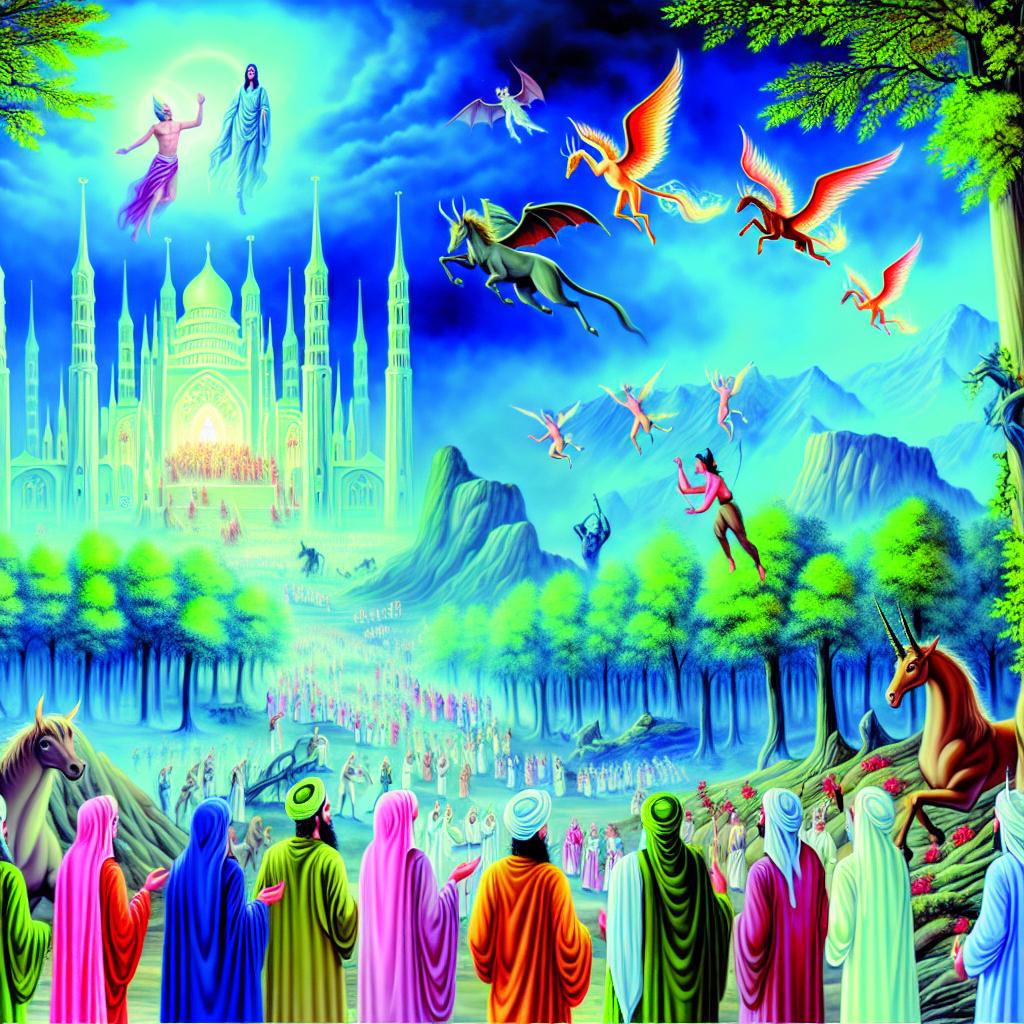The Role of Religion and Gods in Fantasy Stories

The Influence of Religion and Deities in Fantasy Literature
Fantasy literature, as a genre, manifests a profound exploration of religion and deities by incorporating these elements as central themes within its narratives. The presence of religion and gods can serve multiple purposes, such as shaping the mythological foundation of the world, driving characters’ motivations, and providing a catalyst for plot development. This expanded article will delve into the multifaceted role that religion and deities play in fantasy stories, illustrating how they contribute to the depth and richness of the genre.
World-Building and Mythology
The task of world-building is one of the most significant aspects of fantasy literature, and religion and deities often play a crucial role in crafting these fictional universes. Authors frequently create intricate pantheons and distinctive religious practices, infusing their worlds with a sense of authenticity and depth. A quintessential example of this is found in J.R.R. Tolkien’s Middle-earth, featuring an elaborate mythology with deities known as the Valar. The Valar, divine beings wielding immense power, play a pivotal role in shaping both the world’s history and the lives of its inhabitants. This approach serves not only to enhance the richness of the narrative but also to provide a cohesive framework through which readers can understand the diverse motivations of characters and cultures.
The use of religion and gods in world-building underscores the notion that these elements are more than mere background decoration; they are conduits through which the values, ethics, and conflicts of the world are expressed. By grounding fictional societies in religious beliefs and divine interventions, authors create worlds that feel lived-in and plausible, despite their fantastical nature.
Symbolism and Themes
Religion and deities in fantasy literature often carry significant symbolic weight, embodying themes such as the struggle between good and evil, creation versus destruction, and life versus death. By incorporating divine elements into their narratives, authors are able to explore these themes in a profound and multidimensional context. A classical instance of this symbolism is found in C.S. Lewis’s “The Chronicles of Narnia,” where Aslan, the god-like lion, represents Christ and encapsulates themes of sacrifice, redemption, and resurrection.
Through such symbolic representations, fantasy literature is able to convey complex ideas and moral lessons in a manner that resonates with readers on multiple levels. By weaving religious elements into the fabric of their stories, authors have the opportunity to explore existential questions and dilemmas within a narrative framework that is both engaging and thought-provoking.
Character Development and Motivation
Religion in fantasy literature is often used as a powerful tool for character development. The beliefs and spiritual convictions of characters can deeply influence their actions, decisions, and personal growth throughout the story. Robert Jordan’s “The Wheel of Time” series exemplifies this, portraying a multitude of cultures that worship different deities and adhere to their respective religious practices. These beliefs significantly impact characters’ morals and motivations, providing them with a moral compass that guides them through their personal challenges and ethical dilemmas.
By depicting characters with varying religious convictions, authors are able to create narratives that explore the diversity of human experience and the intricate ways in which faith shapes identity. Religion becomes not just a backdrop but an active component in the character’s journey, offering insights into how belief systems can affect human behavior and development.
Conflict and Plot Dynamics
Religion and deities often introduce conflict and tension within fantasy narratives, serving as a catalyst for plot dynamics. The portrayal of religious factions with opposing beliefs can lead to ideological conflicts, animating the plot and driving it forward. George R.R. Martin’s “A Song of Ice and Fire” series presents a vivid example of this, where followers of various religions clash over power, identity, and territorial control. These conflicts enrich the narrative tapestry, providing fertile ground for exploring complex themes of faith, authority, and identity.
Such conflicts also allow authors to delve into the nuanced realities of religious power dynamics, illustrating how faith can be both a unifying force and a source of division. By depicting religious strife, fantasy literature mirrors the complexities of real-world religious coexistence, offering readers an opportunity to reflect on the potential for both harmony and discord.
Exploration of Real-World Issues
Fantasy authors frequently utilize fictional religions as a lens through which to explore real-world issues in an abstract or allegorical manner. Themes such as religious intolerance, zealotry, and the societal impact of faith are often examined within the safe confines of a fictional universe. Through this approach, authors can provide commentary on contemporary issues while maintaining the engagement and immersion of their audience in a fantastical setting.
This allegorical exploration allows readers to ponder real-world problems without becoming overwhelmed by the direct implications, encouraging a more nuanced understanding of issues such as religious conflict, extremism, and the role of faith in society. By addressing these themes through fantasy, authors can foster empathy and provoke reflection, enriching the reader’s understanding of the complexities inherent in religious discourse.
Conclusion
In conclusion, religion and deities play a significant and multifaceted role in fantasy literature. These elements contribute to world-building, theme development, character progression, and plot dynamics, enabling authors to create immersive, richly textured worlds that resonate with readers. By reflecting real-world complexities through the lens of myth and imagination, fantasy literature provides a unique space for exploring the diversity of human experience and the intricate roles that religion and faith play in our lives.
For readers interested in gaining further insights into how religion shapes narratives across different literary genres, engaging with resources and analyses by literature experts can provide a deeper appreciation of the intricate ways in which faith influences storytelling.
Comments are closed.
Comments on 'The Role of Religion and Gods in Fantasy Stories' (0)
Comments Feed